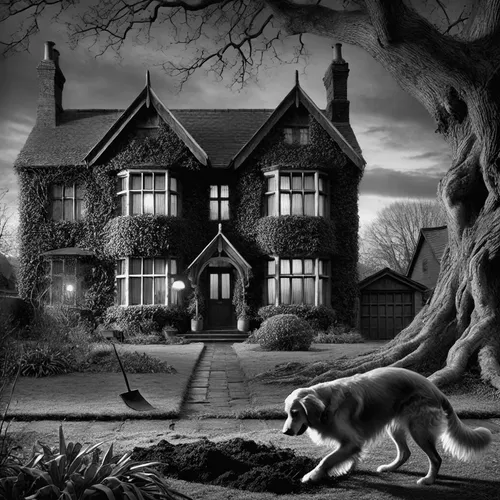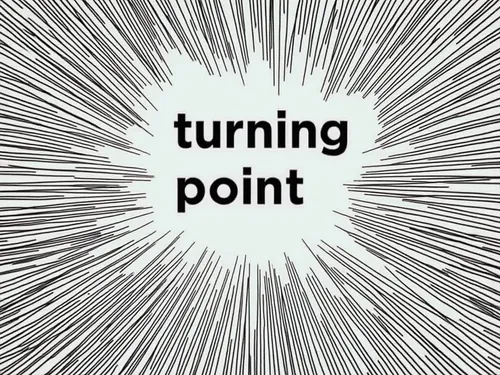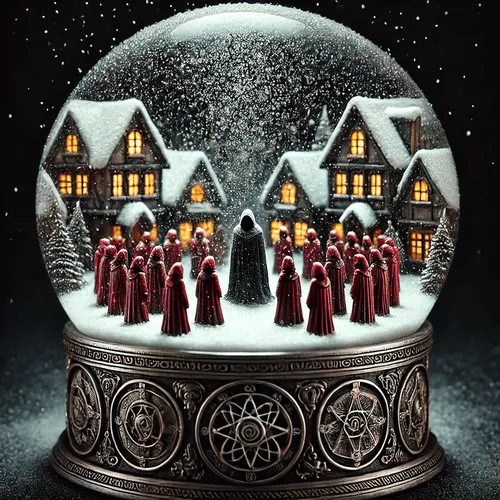She vanished just as the year ended. The neighbourhood was tight-knit, a place where everyone knew everyone. Children played on sidewalks, their laughter echoing through the streets, while neighbours greeted each other warmly over picket fences. Potluck dinners were typical, and no birthday or holiday went by without the entire community coming together. It was where doors were left unlocked, and parents felt safe letting their children roam freely.
So when 12-year-old Ellie Martin disappeared on New Year’s Eve, it was as though the heart of the neighbourhood had been ripped out.
The night she vanished had been one of celebration. Fireworks crackled in the sky as families gathered in their homes to ring in the New Year. Ellie had left her house just after dinner, telling her parents she was heading to her best friend’s home a few blocks away. She never made it.
At first, no one panicked. It wasn’t unusual for Ellie to lose track of time when she was with friends. But worry set in as the hours passed, and she didn’t come home. By morning, the entire neighbourhood was out searching for her.
Search parties combed through the streets and nearby woods, calling her name into the biting cold of January. Police canvassed the area, knocking on every door and asking the same urgent questions: “Did you see Ellie that night? Did anyone notice anything unusual?” Her face, framed by her light brown hair and a dimpled smile, soon appeared on posters taped to streetlights, pinned to bulletin boards, and slipped into mailboxes.
Days turned into weeks. Once brimming with optimism and determination, the community began to lose hope. A shadow of fear and suspicion replaced the neighbourhood’s cheerful energy. Parents kept their children indoors, and whispers of what might have happened to Ellie grew louder. Theories circulated—an accident, a stranger passing through, or something darker.
Months passed, and Ellie’s name was spoken less and less in the neighbourhood. Her weathered and faded posters were eventually taken down. People returned to their routines, but the streets were quieter now, and the sense of trust among neighbours frayed. For Ellie’s parents, the weight of her absence was unbearable. They left the neighbourhood within a year, unable to live, surrounded by reminders of their loss.
Though the years dulled the sharp edge of grief for some, the memory of Ellie Martin never entirely disappeared. Her story became a cautionary tale, told in hushed voices to warn new generations of children. Yet, like all mysteries, the unanswered questions lingered, a faint shadow over the once-bright neighbourhood.
Ellie’s disappearance became only the first of many. More young boys and girls vanished, seemingly without a trace, their lives snuffed out before they could truly begin. It was as though a dark cloud had settled over the neighbourhood, transforming it from a place of warmth and laughter into one of fear and unease. Search parties were formed, and investigations reopened, but each case ended in heartbreak.
The losses took their toll. Families who had once called the neighbourhood home moved away, unable to bear the weight of their grief. New families came, drawn by the charm of the once-idyllic area, only to leave again, often with stories of their heartbreak. The cycle continued, and the neighbourhood, once so full of life, became marked by whispers and wary glances.
But through it all, one family remained: the Waverley.
Mr. and Mrs. Waverley were constantly present in the neighbourhood, offering comfort during its darkest times. With warm smiles and quiet wisdom, they supported grieving families, organized vigils, delivered casseroles, and provided a listening ear when tragedy struck. The Waverleys embody compassion and resilience to those struggling with loss.
Their quaint, ivy-covered home on the edge of the neighbourhood, with its well-tended garden and inviting porch, became a symbol of stability amidst the growing unease. Decades of marriage had given them an air of quiet contentment, and their reserved nature never raised suspicion.
To the families who stayed behind, the Waverley was a reminder of how the neighbourhood used to be—a time before the disappearances, before fear cast its shadow. Yet, beneath their kindness and ever-present smiles, there was something subtle, almost imperceptible, that no one thought to question.
It was now 2024, and the neighbourhood was quieter than it had been in years. The air of unease that once lingered had dulled, but the weight of past tragedies could still be felt in the spaces between conversations and the lingering glances of longtime residents. Beneath the calm surface, a new sadness was brewing just a few blocks away.
The Simmons had recently broken up. They hadn’t had children, but they did share a dog they loved as if she were family. Seven, a sprightly golden retriever, had been the center of their small world, and neither Molly nor Rick could bear the thought of giving her up entirely.
Determined to stay close enough for shared custody of Seven, Molly Simmons found herself renting 113 Idle Creek Dr. The house was old and a bit worn, but it was within walking distance of Rick’s place, and that was all that mattered. Molly settled into her new home, arranging her schedule to have time with Seven. Though the arrangement was unconventional, they both felt it was fair—for the dog, if not for themselves.
Molly tried to keep her spirits up, focusing on work and her afternoons with Seven. She found solace in their walks through the neighbourhood, but something about the air felt different—unsettling in a way she couldn’t quite name. Seven, her lively golden retriever, seemed to sense it too.
Whenever they passed the ivy-covered Waverley house, Seven became restless, her ears perking up as she sniffed the air. Her behaviour was initially strange—just a quick pause to sniff at the yard—but soon, it became something more. She would lunge toward the nicely laid row of shrubs, straining against her leash with unusual force, focusing on one spot beneath the old oak tree in the Waverleys’ front yard.
“Just an old dog thing,” Mrs. Waverley said one day with a gentle laugh when she noticed Seven’s antics. She stood on the porch, smiling warmly, as she always did. Her tone was light, almost amused, as if seeing a dog pawing at her yard was an everyday occurrence. “You know how dogs can be.”
Molly chuckled nervously, apologizing as she tugged Seven away, but the dog wouldn’t budge. Her paws dug into the soft soil, kicking up bits of dirt and leaves. It took Molly’s full strength to pull her back.
Over time, Seven’s fixation only deepened. Each walk past the Waverley house was the same—an unrelenting tug of war. She’d paw frantically at the same spot, her claws scraping against the earth as if determined to unearth something hidden. Molly was baffled by her dog’s behaviour. She tried crossing the street to avoid the house altogether, but Seven would still twist and pull, her eyes locked on the house.
The Waverleys, ever patient, always brushed off the disruptions with their usual kindness. “Don’t worry about it,” Mr. Waverley said once, his tone as calm and unbothered as his wife’s. “She’s just a curious pup. Nothing wrong with that.”
But something in their smiles—something just a little too practiced and composed—stayed with Molly after she walked away. Something about the couple’s effortless charm, perfectly timed smiles, and polite but distant demeanour felt… off.
The more she thought about it, the more Molly’s curiosity grew. The Waverleys, Joan and Edward, were well-known in the neighbourhood from Idle Creek Dr. all the way further to Rick’s street a few blocks away—not just for their kindness but for their impressive backgrounds. Joan was a published writer specializing in children’s books, while Edward had worked as a television producer for years. Though their careers had brought them respect and admiration, they had never quite achieved the kind of fame that reached beyond their local circle.
Intrigued, Molly began to pay closer attention to how they interacted with others. They were friendly but kept to themselves; their kindness was always measured but never too intimate. They were quick to lend a hand during community events but rarely invited anyone into their home. Molly wondered about their past—how long they had lived in the house, where they’d come from before, and why they had never moved on like so many others in the neighbourhood.
Her interest quickly turned into suspicion. Was there something more behind their perfectly curated lives? Was Seven’s behaviour just a coincidence, or was it pointing to something darker?
Molly’s love for true crime and obsession with mysteries fueled her curiosity. She started making her daily walks with Seven more purposeful, lingering just a little longer near the Waverley property. When the neighbourhood was quiet at night, she would take Seven for an extra walk under the guise of needing fresh air. These nighttime strolls were different—calculated, watchful. She’d glance at the Waverley house, its windows glowing faintly from within, the curtains always drawn.
She researched them in her free time, combing through public records and archived articles. The deeper she dug, the more questions she had. It seems Edwards's parents lived there and died, leaving the place to Edward and Joan, with only vague mentions of Edward’s failed projects and Joan’s early writing career. Her imagination ran wild. What if they were hiding something? What if Seven’s instincts were right, and something was buried in that yard? With each new piece of information—or lack thereof—Molly’s curiosity grew into an obsession. She wasn’t sure what she was looking for, but she was determined to find it.
She spent late nights combing through old newspapers, piecing together fragments of the tragic history surrounding Idle Creek. To her horror, she discovered a chilling pattern: dozens of missing children, all within a 10-kilometre radius, spanning decades. And at the center of it all—unwavering and untouched by time—stood the Waverleys, their home positioned like a dark constant in the heart of the tragedy.
Her fixation didn’t go unnoticed. Rick, her ex, grew concerned as Molly’s walks with Seven became more frequent and her conversations more one-sided, revolving entirely around the Waverley. Molly’s mounting paranoia was more challenging to ignore.
One day, Rick tried to intervene. “Molly, you need to let this go,” he said firmly as he clipped Seven’s leash to his hand. “You’re reading too much into this. It’s just an old couple who’s lived here forever. That’s it.”
Molly had tried to argue, but Rick wasn’t having it. He kept Seven with him for a few days, hoping a little distance would help Molly regain perspective. But it didn’t. Instead, Molly’s obsession deepened, and she decided it was time to show Rick everything she’d uncovered.
Late one evening, Molly called Rick, her voice shaky but urgent. “You need to come over. Now. I have to show you something.”
Reluctantly, Rick arrived at 113 Idle Creek Dr. As he knocked on the door, standing on the porch, he glanced at the ivy-covered house that belonged to the Waverleys before walking in, wondering what the hell was going on. He stepped into Molly’s living room and froze. Stacks of old newspaper clippings, printouts, and handwritten notes were spread across the floor and pinned to the walls. Missing person posters, dating back to 1960, stared back at him, their bright young faces hauntingly familiar.
“What… what is all this?” Rick asked, his voice unsteady.
Molly took a deep breath. “It’s everything, Rick. All the children who’ve gone missing in this neighbourhood since the 1960s. Look at this.” She pointed to a timeline she had drawn across a sheet of poster board. “Every time a child vanished, the Waverleys were here. They’ve been in that house for over sixty years. Through all the grief, all the heartbreak.”
Rick frowned, his skepticism beginning to crack. He scanned the headlines Molly had highlighted—‘Local Girl Vanishes Without a Trace,’ ‘Search Continues for Missing Boy,’ ‘Neighborhood Mourns Another Loss’. It was undeniable: the Waverleys had been a constant presence, always there to offer support, but never once touched by the tragedies that had consumed everyone else.
“That’s… strange,” Rick admitted, his voice quieter now.
“Strange doesn’t cover it,” Molly said, her tone sharpening. “They’ve lived in that house through decades of missing children, and no one’s ever questioned it. What if Seven isn’t just being weird? What if she’s picking up on something we can’t see?”
Rick ran a hand through his hair, glancing nervously at the evidence piles. “Molly, this is… a lot. Are you sure you’re not just imagining connections where there aren’t any? Look right here. Edward’s parent left him the house; that’s why they haven’t moved; maybe there is a sentimental reason?”
“Sentimental, all right?” Molly shot back, holding a faded photograph of a smiling young girl. “Ellie Martin. She went missing on New Year’s Eve 45 years ago. She lived three blocks away. And Seven keeps digging in the Waverleys’ yard, Rick. The same yard they’ve had since the day Ellie disappeared.”
Rick’s face darkened as the weight of her words sank in. He had always thought Molly’s fascination with true crime was just a harmless hobby, but now, he wasn't sure about the overwhelming evidence she had collected.
“All right,” he said after a long pause. “Let’s say you’re right. What do we do?”
Molly’s eyes glinted with determination. “We find out what they’re hiding.”
After days of debating and sifting through Molly’s mountain of evidence, Rick returned to her house more often. Despite his initial doubts, the sheer weight of her research, paired with Seven’s inexplicable behaviour, had begun to gnaw at him. As much as he wanted to dismiss it all, something didn’t sit right. Her voice had a conviction now, a desperate certainty he couldn’t ignore.
One night, after another heated discussion, Rick sighed heavily and looked at her. “I can’t keep pretending it’s not real. Maybe you’re right. Maybe there’s something here. No matter what, I can’t let you do this alone anymore.”
Molly blinked, her shock giving way to relief. “What are you saying, Rick?”
“I’m saying I should move in,” Rick muttered. “If nothing else, to keep you from spiralling. Someone needs to keep you grounded, and I’m not letting you turn into one of those conspiracy nuts alone.” With a smile, they both chuckled.
Within a week, Rick had moved into the spare room at 113 Idle Creek Drive, bringing with him not just Seven but a renewed sense of purpose. While Molly was the brains behind the operation, Rick got a level-headedness that kept her from diving too far off the deep end. Together, they began crafting a plan to figure out precisely what the Waverleys were hiding and, if necessary, expose them.
Molly, naturally, took the lead on surveillance. Armed with her notebook and binoculars, she spent hours watching the Waverleys from her front window, documenting their every move. When Mr. Waverley went out to water the garden, she noted how Mrs. Waverley always seemed to be carrying trays of something into the backyard.
Rick, on the other hand, took a more practical approach. He dug into property records and archives to trace the Waverleys’ history in the neighbourhood. It turned out they had inherited the house from Mr. Waverley’s parents in the late 1950s, when the first disappearance occurred.
“They’ve been here since the beginning,” Rick muttered one evening, sliding a folder of records across the kitchen table to Molly.
Molly flipped through the documents, her brow furrowing. “And they’ve barely updated anything. No major renovations, no moves. Just… here. Quietly existing through decades of tragedy.”
“It’s too convenient,” Rick said. “No one stays in a place like this unless they have a reason to. Even if they inherited the place, there’s too much tragedy to stay. ”
Their late-night brainstorming sessions grew more intense as the days went by. Despite his earlier doubts, Rick was drawn deeper into Molly’s obsession. They started discussing ways to get closer to the Waverleys and learn more about their routine without raising suspicion.
“I could offer to help them with yard work,” Rick suggested one night, half-joking.
Molly smirked. “You, yard work? I’d pay to see that.”
“Hey, I’m serious. Maybe if we seem friendly, they’ll let their guard down.”
“I don’t think they have guards to let down,” Molly said, her tone darkening. “They’ve lived here so long, they probably think they’re untouchable.”
Despite her skepticism, Rick’s idea seemed to have merit. The next day, he stopped by the Waverleys’ house under the guise of introducing himself as the new neighbour. Mr. Waverley greeted him with his usual polite smile, and Rick made small talk about the neighbourhood and offered to help with any heavy lifting.
To Rick’s surprise, Mr. Waverley invited him in for a cup of tea. The house was just as pristine inside as outside, but something was unsettling about it—an air of perfection that felt forced. Family photos lined the walls, but none of them were recent.
When Rick returned home, he told Molly everything. “They’re polite, almost too polite. But the house… it feels like a museum. Like they’re trying to preserve something.”
“Or hide something,” Molly replied, her eyes narrowing.
As their plan unfolded, Rick and Molly grew bolder. Molly began taking night walks around the Waverleys’ property, her flashlight off but her ears attuned to every sound. Rick, meanwhile, focused on gathering evidence—photographs of the backyard and recordings of the Waverleys’ strange late-night comings and goings.
They didn’t know exactly what they were looking for, but they were confident of one thing: the Waverleys weren’t the kind, unassuming couple everyone thought they were. Something dark lingered beneath their surface, and Rick and Molly were determined to bring it to light—no matter the cost.
Molly leaned in closer, her voice trembling. “What if the Waverleys know more than they let on? What if they’ve been hiding something in plain sight this whole time?”
Rick stared at her, then at the wall covered with evidence. His jaw tightened, and for a moment, Molly thought she’d finally broken through his skepticism. But then he sighed and shook his head.
“Molly, this is a serious accusation,” he said carefully. “You can’t just assume they’re involved because they’ve lived here long. This could destroy their lives if you’re wrong.”
“Wrong?” Molly snapped, her frustration bubbling over. “How many more coincidences do you need, Rick? Look at the patterns! Look at what Seven’s been trying to tell us!”
Rick hesitated, clearly torn. He opened his mouth to respond, but Molly grabbed Seven and slammed the door before he could.
Molly stormed out of the house, her heart pounding as Seven tugged on the leash, dragging her toward the Waverley property. The dog’s frantic energy was like nothing Molly had ever seen before. Seven barked sharply, her nose glued to the ground as if following an invisible trail.
“Seven, slow down!” Molly hissed, glancing nervously over her shoulder to see if Rick had followed. But the street was quiet.
Seven stopped abruptly in the middle of the Waverley’s yard, sniffing and pawing at a patch of dirt near the base of a large oak tree. Her whines grew more insistent as she clawed at the ground.
“Seven, no! You can’t—” Molly’s words faltered when she saw how the dog’s body trembled, as though something urgent lay beneath the surface. Her breath caught, and she felt an unshakable pull to the spot. She dropped to her knees, the leash slipping from her fingers.
Rick’s voice echoed faintly behind her. “Molly! What are you doing? Get back here!”
She ignored him. Her hands moved of their own accord, brushing the cold, damp soil where Seven had started to dig.
By the time Rick reached her, the urgency in her movements had intensified. “Molly, stop. You’re gonna get us into trouble!” he snapped, but his tone had no force—only unease.
“Help me,” Molly said, her voice low and shaky. She didn’t even look at him, focusing on the earth below.
For a moment, Rick hovered uncertainly. Then, seeing the sheer determination in her eyes and the wild desperation in Seven’s barking, he sighed heavily and dropped beside her.
“What the hell is that?” Rick whispered, his voice barely audible.
Molly didn’t answer. Her hands trembled as she pried the box from the ground and opened it. Inside were fragments of what appeared to be old, brittle papers. Some were covered in faded, childlike handwriting; others were small, grainy photographs of smiling children. One of the photos made Molly gasp—it was Ellie Martin, her dimpled grin unmistakable, frozen in time.
Rick recoiled. “Molly… this can’t be real.”
But before either of them could say another word, the sharp creak of a door hinge made them freeze. They turned toward the sound and saw Joan Waverley standing on her front porch, her silhouette framed by the dim light spilling from the kitchen. Her kind smile was gone, replaced by a cold, calculating expression that sent a chill down Molly’s spine.
“You’ve been busy, haven’t you?” Joan said, her voice calm but icy.
Molly’s blood ran cold. She clutched the tin box to her chest as Joan descended the steps, her movements slow and deliberate.
“You should have left well enough alone,” Joan continued, eyes locking onto Molly’s. “But now… you’ve dug too deep.”







This story has not been rated yet. Login to review this story.